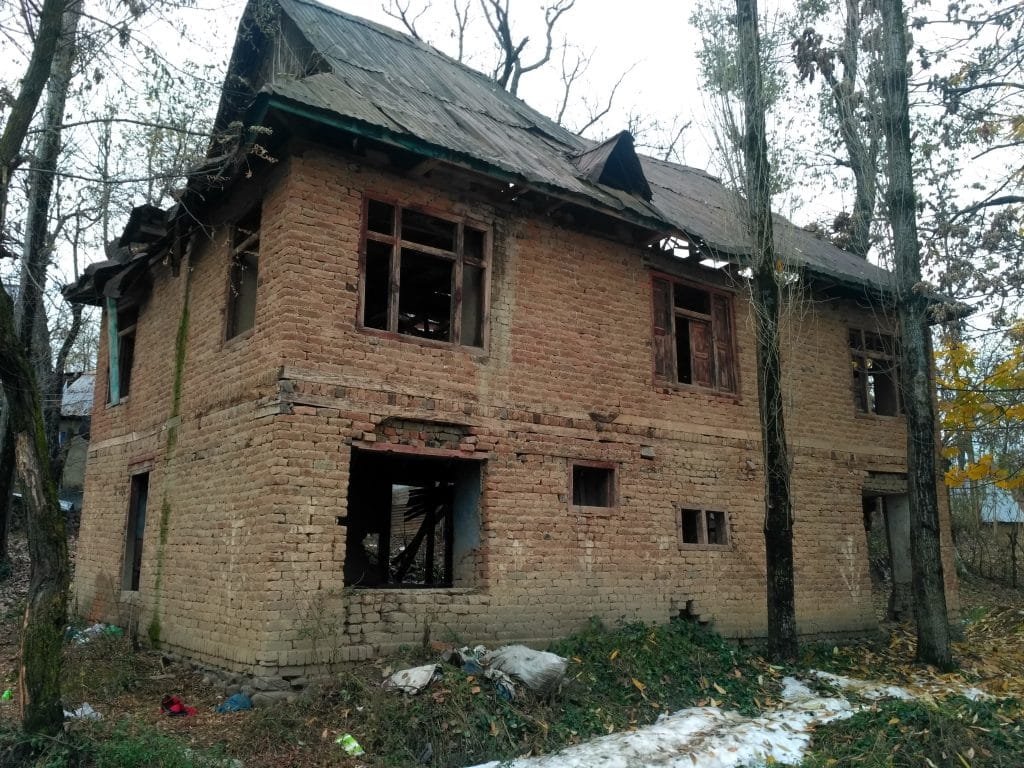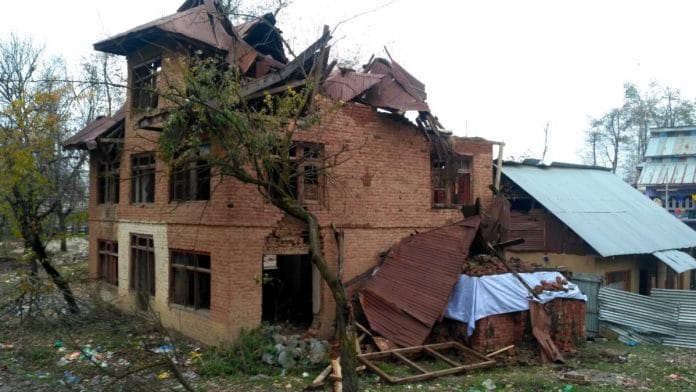The emerging optimism about the return of Kashmiri Pandits to the Valley can be understood through four broad, often conflicting, prisms. On Twitter, there is a new campaign around the #HumWapasAyenge showing various people vowing to return to their homeland in Kashmir in the 30th year of their exodus.
The first is through a nest of dilapidated homes that lay abandoned in Chowgam village of Kashmir’s Kulgam district. Of about 50 Kashmiri Pandit families that lived in the village before the exodus, only one remains today. Some homes have been purchased by Muslim neighbours, some are in ruins. Covered by chinar and walnut trees whose yellowed leaves scatter around, such melancholic homes are recurring images across the Valley.
Kuldip Kaul can’t wait for more to return to Chowgam, which he had left on 6 March 1990. He settled in Jammu and sold the home to his neighbour, Farooq Ahmad. “We are ready. If the sentiment builds up, we can return today,” Kaul, 50, told me.
However, what he says next adds another layer to the exodus story. Kaul visits Chowgam every year, lives in “his home”, that is with Farooq. “My neighbours were crying when we were leaving, requested us to stay back,” he said, remembering the tragic journey.
And where will he resettle now? “At first, they (Farooq) will not let us go anywhere. They will say that come and stay on the second floor”.
This sentiment, not a part of India’s dominant narrative today, shows that the camaraderie between the two communities is not yet lost in Kashmir.

However, along with hope also exists bitter truth. Sanjay Tickoo, the president of Kashmiri Pandit Sangharsh Samiti, is barely hopeful. “The atmosphere has not changed. Hashtags won’t help anything. If they want to return, they can return. It is to be seen how many (of those who are running the campaign) are actually interested in coming back and settling down,” he said, dejectedly.
Tickoo vividly recalls early 1990 when mosques in his Srinagar neighbourhood saw Jammu Kashmir Liberation Front (JKLF) posters carrying certain names. Any Kashmiri Pandit whose name was found on the hit list was soon killed. Having survived the scare, he is among the few Pandits who stayed back in the Valley.
Also read: For Kashmiri Pandits, Azadi slogans are bringing back a three-decade old nightmare
Growing rift between Pandits
Amid the talk of return, a group of Kashmiri Pandits living in the Valley are disappointed that their voice remains lost and neglected while the articulate Pandits in Delhi and abroad have emerged as the chief spokespersons of the community. More than 800 Pandit families that never left Kashmir even during the worst phase of militancy and put up great resistance over the last three decades find little space in the ongoing discourse.
Ever since Jammu and Kashmir was dismantled on August 5, no government or administrative functionary, or any BJP politician, has visited the Pandits in the Valley to understand their condition or have a dialogue with them. The rift between the Kashmiri Pandits living in the Valley and those who live outside seems to have widened in the last few months. It may further upset the already complicated inter-community relations in Kashmir and may not be very conducive to the return journey of the Pandits.
The third prism relates to Kashmiri Muslims, the prime actors in the return story. While no one is against the return of Kashmiri Pandits in principle, few Muslims seem willing to honour the genuine concerns of Pandits through an unconditional apology for their failure to prevent the exodus and, at times, becoming collaborators in the killings.
While some are indeed upset about the predicament of the Pandits, a large majority of Kashmiri Muslims in various districts I spoke to tried to rationalise the tragedy. They admitted that the killings should not have taken place, but few Kashmiris reflected a sense of guilt or acknowledged that their silence signified tacit complicity. As Kashmiri Muslims rightfully raise their voice against the Narendra Modi government over the current lockdown, they will also have to take a few extra steps to embrace the Pandits and help facilitate their return. In the absence of this, the public conversations on the subject may well remain skewed.
Also read: BJP has no competitor in Kashmir right now. But it’s still unable to create new politics
Pandits just political pawns for Modi govt
The fourth factor is the Narendra Modi government that needs to take credible steps instead of indulging in empty statements or using Kashmiri Pandits as political pawns and, as Tickoo says, “cannon fodders”. The government’s approach towards the Pandits who have returned to the Valley over the years betrays little hope. Around 3,500 Kashmiris, mostly Pandits but also Sikhs and Muslims who were forced to migrate, have returned and joined various government departments under the prime minister’s return and rehabilitation programme announced by the Manmohan Singh-led UPA government in 2008. Most of them live in ghettoised camps under heavy security across the Valley up to Baramulla. Successive governments have failed to provide them a dignified rehabilitation.
Even the Supreme Court has been found wanting in its stand towards Kashmiri Pandits. In 2017, the Supreme Court dismissed a PIL filed by a group of Pandits seeking an investigation into the killings on the ground that happened nearly three decades ago.
The tragedy of Kashmiri Pandits, both of those who left and those who stayed behind, remains underreported and needs multiple retellings. Of late, some Pandits have also begun comparing their sorrow with other contemporary tragedies in a rather simplistic way that eventually adds to anxieties on both sides.
The return of Pandits is necessary for the idea of India. To accommodate the conflicting claims of various actors and ensure the cheerful arrival of convoys of Pandits in Kashmir, all the sides need to shed past baggages and carry large hearts. Any political or personal chicanery will make the already difficult return journey nearly impossible.
The author is an independent journalist. Views are personal.







I am a Kashmiri Pandit Woman , unmarried , who joined a reputed organization in Kashmir out of her own hardwork and conviction . I must say this article is very important , the plight of many young individuals like myself who have to go through that trauma one after the other under the inconsiderate ignorance of governance / institutions on our plight is thick . I am right now in sub degrees , denied a contract renewal made to beg my own alma mater organization by the local authorities for issues that could have been resolved . I am jobless , currently and my retired elderly parents are forced to drive up in this pandemic , risky highway to rescue me from this situation . My experience with many cultures both national and international set me aside the impolite conversations that seem to be normal around here . Leaving me socio-economically challenges with great anxiety and noway to feel at home in my own homeland .
There must be a survey by all media how many in India ve bn being driven away everyday from different parts of d Country where d majority r a minority.
In a country here constitution is referred to only protect d interest of those who r a potential vote bank, it is very difficult to look into d routine plight of d Majority whom constitution and politics of appeasement have made foreigners in their own land. Here history is written to show d Hindus as invaders, and others true inhabitants by their might, might of killing Hindus. The race who have tortored the Hindus more r d only genuine inhabitants of d land, so as d Nehruvian idea of Indianness is concerned.
It is really difficult for Kashmiri Pandits to return. D report is aimed at showing d KPs in JK as d greatest deterrent to d return. Show d game has started.
Whether it is difficult or not, the first plank of Government Kasmir Policy should be to to rehabilitate the displaced Kashmiri Pandits. Presuming that the exodus was forced on them due to JKLF depredations, one expected voices being raised from all over Kashmir – from their neighbours, liberals, thinkers, academicians, politicians and the common folk alike – exhorting the Kashmiri Pandits to come Back. It will be our monumental failure if they are not recalled to their homeland.
Return of KPs/Sikhs to Kashmir valley is a smoke screen and so is the so called comaraderie with Kashmiri muslims. No one will even think of risking their lives and the izzat of their women; finally, it was the neighbours of these KPs/Sikhs who killed and raped or abetted (there were no Paki terrorists). Stories of Kashmiri muslims asking for return of their KP/ Sikh neighbours is false, as most of the KPs land, houses, orchards have been occupied by these Kashmiris. The govt should compensate (as it failed to give safety and security to them) the KPs/Sikhs by making the illegal occupiers pay for the period of illegal occupation at present prevailing rates. KP’s land and orchards should be taken on lease by the govt from them and revenue obtained from occupants. Those who got a pittance for the panic selling of property should be given compensation for the difference amount. KPs/ Sikhs should be given land to settle down in Kashmir or in Jammu. There should be at least 10% reservation for KPs/ Kashmiri Sikhs in UT educational institutions and UT jobs.Children should be given scholarship to the tune of 100%.
I completely agree with your point. They cannot simply return to nothing. Government must facilitate all the points you’ve highlighted. Plus extra security.
Kitna achha mauqa thaa, to bring peace and harmony to the Valley. An unusual coalition government in the state, partnered by the dominant force in Delhi. Kashmiri Pandits could not have returned overnight, but a beginning could have been made. Sometimes wonder if there is genuine sympathy for the KPs or their plight and suffering are being weaponised for political purposes.